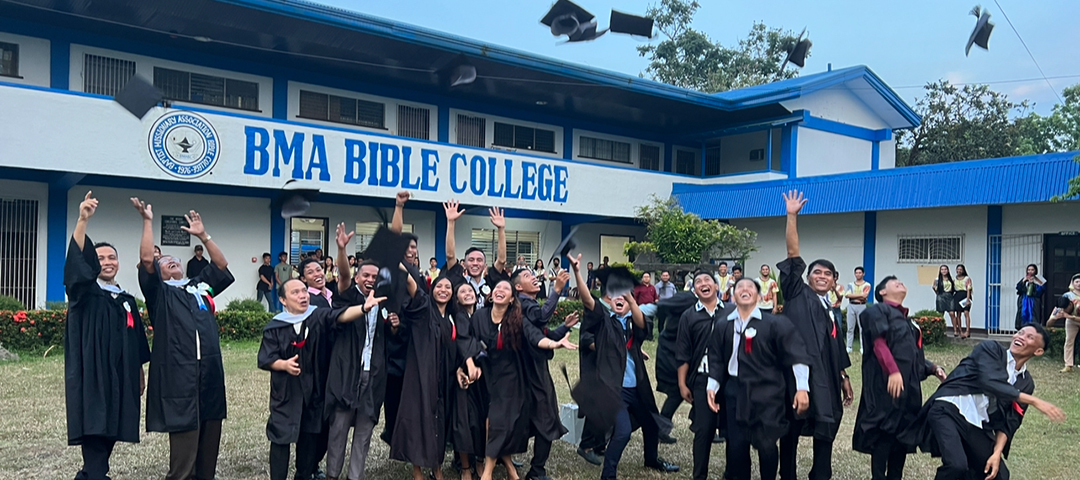
How Do I Follow God’s Calling?
February 27, 2024
Training the Leaders of the Future
March 12, 2024By Stan Scroggins, Asia Pacific Regional Coordinator
In 1976 the Baptist Missionary Association Bible College in the Philippines began training the first Filipino pastors. The college has gone through many changes, most recently achieving CHED (Commission of Higher Education) accreditation. In addition to offering degrees in theology and pastoral leadership, the institution also provides training in religious education and music. The most recent program addition is cross cultural church planting to prepare Filipinos to take the gospel to all of Asia Pacific.
Today, closing in on 50 years of training pastors and missionaries, the Baptist Missionary Association Bible College can be proud of training over 90% of all pastors of the Baptist Missionary Association of the Philippines. As alumni these men share a sense of connection, tradition, and heritage that uniquely binds them together.
As educational institutions grow they will invariably and of necessity need to also grow their financial base. The number one way to do this is by adding programs and degrees, bringing in new students and therefore a new financial stream. But history has proven that in doing so the institution slowly and almost imperceptibly loses the vision of its original mandate: “training missionaries and pastors.” Today when one thinks of Harvard, Princeton, Yale, and even Oxford University, it is not theology and divinity training that comes to mind, which was exactly the purpose and intention for the founding of each of these great universities.
Revelation 2:17 begins Jesus’ admonitions to the seven churches of Asia, the first one to the Church at Ephesus. In a 2017 article, Got Questions Ministry explained the Ephesians’ dilemma like this: “Surrounded by paganism and false teachers, the Ephesian church would have had ample opportunity to correct false doctrine and confront heretical teachers. If they did so for any reason other than love for Christ and a passion for His truth, however, they would have lost their way.” In other words they would have “lost their first love.” Many Christian ministries and institutions are no doubt doing good and important work focusing on education, feeding programs, health programs, housing, all of which are basically attempting to alleviate the human condition. But, too often these ministries have “lost their first love”–the saving of souls, disciple making and church planting.
Training the next generation of pastors and missionaries must be the highest of priorities, especially for missionary sending organizations like BMA Global. The modern and renewed focus of disciple making is the key, but even more important is to which institution the mandate to do so is given. Mark Dever, celebrated founder 9Marks, avowed, “Seminaries are not made to make pastors. Churches make pastors.”
Training the next generation of pastors and missionaries in the Philippines is a church mandated responsibility. Care must be given to remember that the Baptist Missionary Association Bible College is a tool, an exceptionally good tool, available to Filipino churches to assist them in their preparation of their missionaries and their church planters.
How can the local Filipino church fulfill her mandate to raise up the next generation of pastors and missionaries? Here are a few suggestions, which many Filipino churches already do.
First, avoid the idea of making it the responsibility of the college to call preachers. God does the calling, churches do the sending. Send students who have been vetted, prayed over, and proven within the local congregation. Make it a priority to send students who have a confirmed call to ministry.
Second, provide informal training and internship experiences. Give young men opportunities to read, prepare expositional sermons, preach locally with constructive critique, sit in on decision making, sit in on pastoral counseling, and make pastoral visits.
Third, support the students you send for training. Training is expensive, so invest in the ministry of training students by supporting those you send. Today it is ever so easy to stay in contact with students at school. Contact them and pray with them.
Next, let it be known to the congregation the challenges students face: traveling far from home, home sickness, financial needs, material needs.
Fifth, don’t overlook mistakes, but don’t crucify the student who made them.
Lastly, let the local church be a student’s first class room. Let them see the best and the worst. Don’t let a prospective pastor make the same mistakes his sending church has made.
The best ministry preparation takes place where there is a partnership between the Bible College and the local church. The Bible College merely puts on the finishing touches to the young men the local church has invested in and already trained and mentored. Some things are learned in the classroom. Some things are learned in the local church. Many churches in the Philippines are doing good work “raising up the next generation of pastors.” May God bless these and touch the heart of every pastor and congregation to do the same.

